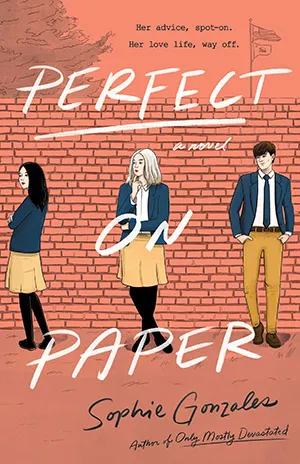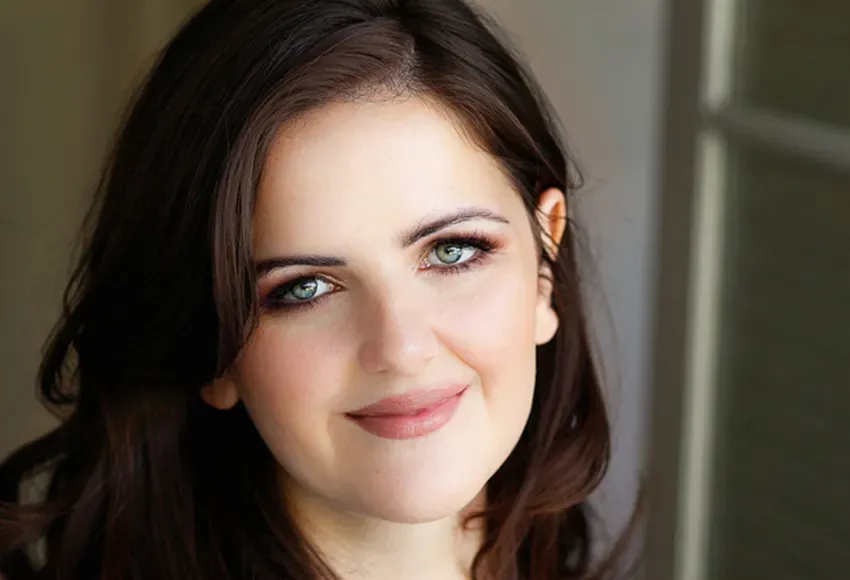As the LGBTQ+ community continues to grow, many are asking, "What does it mean to be Queer?" While a simple answer, such as "being in a same-sex relationship," might have sufficed 20 years ago, we are now evolving to understand that Queer relationships come in many forms and sometimes may even appear, on the outside, as heterosexual.
Author Sophie Gonzales wanted to explore this side of queerness when she set out to write her third novel, Perfect on Paper, and so she decided to center the story on a Bisexual female-male couple. For Gonzales, the inspiration came from the backlash she received after writing a Bi side character who ends up in an opposite-sex relationship in the end.
Fighting biphobia
"The main reason I wanted to focus on a male-female relationship in this book was that I had received a biphobic comment about another book that I had written, Only Mostly Devastated. There's a Bi character in that who ends up with a guy in the end.
"When I was writing that plotline, I was like, 'Yeah, that character fits her best. Great that that's who she ends up with.' But it became quite a bit controversial, and I was surprised," Gonzales said.
"There was this biphobic opinion that the character is somehow less Queer if it's a Bisexual character that ends up in a different-gender relationship. I have had people quarrel publicly about why the book is considered LGBT when there's not a same-sex relationship front and center... You know, LGBT is not only the L and the G, and it's not only Bi people, either. You can be a Trans person or a Nonbinary person or an Ace person who's still in a male-female[-presenting] relationship. That doesn't impact whether it's an LGBT story, so that's another misconception that I've seen come up quite a bit."

Perfect on Paper follows the story of a Bisexual high schooler, Darcy, who runs a dating advice column out of her locker and gets blackmailed by a new student who wants to help him get his girlfriend back. As Darcy pines over the girl of her dreams, she starts to wonder if the scheming boy next door might be her perfect person all along.
From her initial conception of the book, Gonzales knew she wanted her main character to be Bisexual and to end up in a relationship with a boy. "It was pretty much from the start," she said. "I had a conversation with my editor, and when I pitched the book, it was always going to be about a Bisexual character who ended up in a relationship with a guy. I said, 'Is it better if I make this a sapphic romance?' and my editor was like, 'No, if you want it to be this kind of story, if that's the kind of point you want to make, then that's the point you should be making. Go forth.'"
Writing from the female perspective
Perfect on Paper wasn't just Gonzales' first novel to tackle biphobia, it was also her first novel told from the point of view of a female protagonist. "My whole life I've been writing, but I've been writing from the male point of view," she said. "Although, when I was younger, I usually wrote from the straight male point of view, so it was a really big change to write from the female perspective. It took me a little while to get into Darcy's head."
Gonzales says she grew up reading books with male protagonists most frequently. "That's what I was exposed to," she said. "I think when we're exposed to things, often that becomes the default in our mind, and we become comfortable writing from that default perspective, even if it isn't our perspective."
Writing from the point of view of a female lead was a challenge for Gonzales. "I think there was an air of unfamiliarity there, which sounds ridiculous, but that's definitely what I experienced. And there are different things you need to keep in mind when you're writing... from the female perspective. Audiences, frankly, tend to view personality traits a little bit differently if they're coming from a girl character, unfortunately. Usually, let's be frank, in a negative way. So I think there was that extra layer of needing to be cognizant of how my readers might react to this character."
A Queer author from Down Under
Gonzales is a bit of a pro when writing stories set outside her lived experiences. She is from Australia but has yet to set a book in her home country.
"They're always in America. The Law of Inertia wasn't going to be set anywhere – I ended up setting it in the UK though, because I needed to set it somewhere... So far, I haven't set anything in Australia."
While fans of Gonzales may be surprised to find out she does not live in the US, she says writing stories set here isn't as challenging as one might think. "I think in a lot of ways, it's probably easier for me to write an American character than I would imagine it would be for an American author to write an Australian character, because, in Australia, so much of the media is American. We get American movies, American TV shows, American brands, music – you grow up knowing a lot about American culture."
Despite considering herself an American enthusiast, Gonzales admits, there are still some things she just doesn't understand about American culture. "There are certain things that I get wrong and will continue to get wrong. Sometimes there are words or phrases that I had no idea were only Australian, so I do get a lot of help from my editors or my American writing friends. Or sometimes there will be things that I straight up can't wrap my head around, like the college system... I have to ask and have so much help there. Sometimes I do think it would be a much smoother writing process if I could write about the experience that I lived, certainly."
A new kind of love story
Now, she's trying to break away from writing the types of stories she read growing up. "I want to be able to use my voice to give these stories to the teenagers of today so that they can see themselves in books. I think that not only are they important stories, but they're the stories that interest me. I love writing them."
Gonzales first discovered her love of Queer stories when she decided to add an LGBTQ+ side character to one of her early, unpublished drafts. "The first time I wrote a Queer character, it was a side character in a novel I was working on, and I realized that I was much more preoccupied with what was going on with them than I was with the cis-het couple that the story was supposed to be about. So, I thought, how about if [in] the next book I focus on a couple of Queer characters. And it felt very right to be stepping into that space, and from then on, I never really looked back."
Bisexual characters have become a staple of Gonzales' writing. "I think that every book I have written so far has either had a Bisexual main character or love interest," she said.
Gonzales is always on the lookout for more Bi representation in literature, especially in the contemporary genre, but so far, there are still so few she cannot even pinpoint a common trope in Bi stories. "I would love for there to be enough rep that we could have a trope where it's like, 'This always happens! Every Bi book I read!' That would be a lovely happy ending for me," she said with a laugh.
If it tropes your boat
Gonzales is a huge romance fan and says she loves when classic tropes are written well. "I love 'hate-to-love,' and I'm a sucker for a well-done 'there's only one bed.' I love 'hurt comfort,' [where] two characters grow closer because one character has gone through something difficult. I'm an absolute sucker for that."
Her favorite trope is one close to many Australians' hearts. "I do love the trope where there's a nickname, or a different name until they become closer, because I've lived through that so many times. In Australia, it's really common to give people nicknames, more common than it is to call people by their proper names, probably. So, it's a thing in Australia, once you start dating someone, to call them by their given name, and it's like once that happens, you've crossed a threshold."
As a romance writer, Gonzales has seen it all and knows what she'd never like to see again. "I can't stand a girl who needs saving. Like, I don't personally love the girl who doesn't believe in love, and a guy comes into the picture, and she's like, 'No, I can't ever fall for anyone, because I've been hurt too many times!' and he's like, 'I'll make you believe in love!' Not so much my thing, though I could probably get around a gender swap there."
She also hates seeing catty girl-on-girl hate. "I hate an over-the-top villain, especially if it's like a cheerleader villain, where she's like super nasty, and it's just this isn't even a character, it's a walking insult who comes on the page to say something nasty and then scream and run away," she said with a laugh.
Gonzales' least favorite thing to see in any book is forced outings. "I think that there can be harm done if it's poorly handled," she says. "When the couples have a difference that they can't overcome, if the difference is that one of them isn't ready to come out, then that needs to be handled carefully, so that the story isn't framing the closeted person as a villain."
Looking forward
Every book Gonzales has published includes LGBTQ representation, and she plans on continuing the trend with her newest releases as well. At the end of 2021, she released her latest Gay romance, If This Gets Out. The novel was co-authored by Cale Dietrich, who Gonzales says came up with the initial plot.
"It's a... romance drama about two guys from America's biggest boy band who fall for each other and start dating, but their management won't let them announce their relationship to the world, so they have to stay closeted," Gonzales explained. While the story might sound like something from a 2013 One Direction Wattpad page, Gonzales said Dietrich had no idea boy-band ships were so popular among teen fans.
"But I knew all about those fanfics," Gonzales admits, "and I told him he had to read them before we continued writing," she laughed.
Her next release will hit shelves in late 2022. "It's called The One That Got Away. It's about a girl who gets invited onto a reality TV show where her cheating ex-boyfriend re-dates all of his ex-girlfriends, and she teams up with the girl that he cheated on her with to try to get to the finale and take him down on live television."
While Gonzales admits she has tended to tackle dark topics in her rom-coms, her latest romances are pure fluff and fun. She hopes readers can take away from her work that Queer stories and Queer people do not have to look a specific way and that who you choose does not define your place in the Queer community.
Perfect on Paper and If this Gets Out are available now. The One That Got Away will be released on December 6, 2022. If you are interested in reading Perfect on Paper with the SGN Book Club, follow us on Instagram at https://www.instagram.com/sgn_books/.


